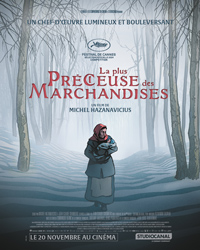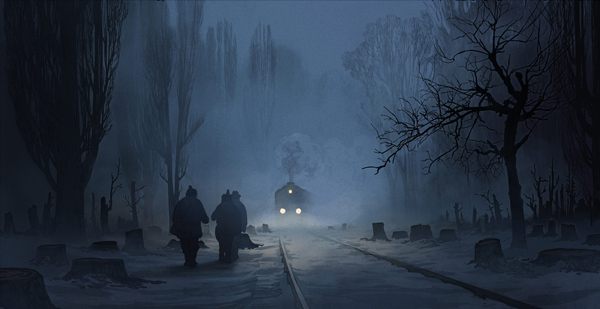The Zone of Disinterest: Hazanavicius Reanimates the Holocaust in Moral Fable
 What’s most interesting about director Michel Hazanavicius are his valiant attempts at dabbling in multiple genres and styles, clearly exemplifying a broad taste in cinematic subjects and inspirations. Unfortunately, most of these attempts often feel as if they’re missing key ingredients to make them noteworthy (though, based on the numerous accolades heaped upon his Best Picture winning 2011 film The Artist, he sometimes comes close). After an earnestly disastrous remake of Fred Zinneman’s The Search (2014), a curiously dull biopic with Godard Mon Amour (2017) and a remake of a meta Japanese zombie comedy in Final Cut (2022), it would seem Hazanvicius works best when navigating humorous elements (like his OSS Bond spoofs from earlier in his career). Now, he’s at last unveiled a long gestating animation film, The Most Precious of Cargoes (La Plus Précieuse des marchandises), a dark fairy tale about the Holocaust and a rescued Jewish infant. Well-intentioned and a bit harpooned by its own sincerity, the sentimental moral lesson it extols, to borrow an Andrezj Zulawski title, seems to be ‘the most important thing is to love.’
What’s most interesting about director Michel Hazanavicius are his valiant attempts at dabbling in multiple genres and styles, clearly exemplifying a broad taste in cinematic subjects and inspirations. Unfortunately, most of these attempts often feel as if they’re missing key ingredients to make them noteworthy (though, based on the numerous accolades heaped upon his Best Picture winning 2011 film The Artist, he sometimes comes close). After an earnestly disastrous remake of Fred Zinneman’s The Search (2014), a curiously dull biopic with Godard Mon Amour (2017) and a remake of a meta Japanese zombie comedy in Final Cut (2022), it would seem Hazanvicius works best when navigating humorous elements (like his OSS Bond spoofs from earlier in his career). Now, he’s at last unveiled a long gestating animation film, The Most Precious of Cargoes (La Plus Précieuse des marchandises), a dark fairy tale about the Holocaust and a rescued Jewish infant. Well-intentioned and a bit harpooned by its own sincerity, the sentimental moral lesson it extols, to borrow an Andrezj Zulawski title, seems to be ‘the most important thing is to love.’
A poor woodcutter (Gregory Gadebois) and his wife (Dominique Blanc) live in the secluded Polish woods. Theirs is cold, humdrum existence, reminded of the outside world only by the barreling trains transporting Jews to Auschwitz. The wife has prayed endlessly for a child after their only offspring died some time ago. One day, while gathering firewood, she hears the cries of an infant in the snow by the train tracks. Rescuing the child, she brings her home, telling her husband she’s a gift from the god of the train. However, the husband refuses to have the child in the house, believing the race of people she descends from are evil. Moving into the woodshed, the wife makes a pact with a WWI veteran (Denys Podalydes) who lives nearby with a goat, giving him firewood in exchange for milk. Eventually, her husband grows fond of the joyful infant. But his fellow woodcutters become suspicious of the baby’s whereabouts since the wife is beyond her child bearing years.

Much like many American films reenacting the Holocaust, language can sometimes be a confusing hurdle to pinpoint exact dates and locations. The poor woodcutter and his wife, not to mention omniscient narration from the late legend Jean-Louis Trintignant, are speaking French, which means it takes a while to realize the setting is Poland, not far from the gates of Auschwitz. The voice work from French stalwarts Gregory Gadebois and Dominique Blanc is serviceable, appropriately limited to vague elements of xenophobia. Here, the Jewish people are referred to as ‘the heartless,’ with the pithy realization the woodcutter experiences being ‘the heartless have hearts.’
Hazanavicius is adapting from a novel by Jean-Paul Grumberg, a writer with extensive experience on WWII having also penned The Last Metro (1980), an enduring Francois Truffaut masterpiece, and the Costa-Gavras Nazi whistleblower film Amen (2002). He’s not the only esteemed name behind the scenes, as the Dardenne Bros. and director Robert Guediguian also co-produced the feature. Composer Alexandre Desplat continues in a vein of gushy triteness with his score, on the heels of equally distracting offerings in Wes Anderson’s Asteroid City (2023) and Roman Polanski’s The Palace. The animation itself has a nostalgic charm, the handful of characters drawn with thick brushstrokes, which lends them a necessary ruggedness considering their rough, isolated existence. Hazanavicious employs a wordless flashback sequence to explain how the baby was thrown from the train, the father of twins reenacting a Sophie’s Choice (1982) decision. The narrative follows the travails of this father, barely surviving Auschwitz, with Hazanvicious depicting liberation as an equally treacherous period. Some striking, disturbing visuals are tastefully employed to depict the fate of the murdered.
And then, The Most Precious of Cargoes employs coincidences where father and infant later cross paths, though these moments feel surprisingly muted considering Trintignant’s final narration about the importance of love. In many ways, this feels like the animated version of Claude Berri’s classic The Two of Us (1967) in which Michel Simon plays an anti-Semitic man charged with caring for a young Jewish boy in occupied France. It’s a comparison which suggests The Most Precious of Cargoes could have benefitted from feeling less spelled out, less perfunctory. Its missing key ingredient is verisimilitude.
Reviewed on May 25th at the 2024 Cannes Film Festival – Competition. 81 Mins.
★★/☆☆☆☆☆


